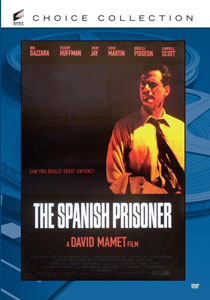There’s something suspicious about the way people are acting around Joe Ross (Campbell Scott) in “The Spanish Prisoner” (1997). As the creator of The Process, a mathematical formula that will allow the corporation he works for to make loads of money, he’s paranoid – and us along with him – but he’s right to be cautious. Still, it seems like he’s being set up for something, by someone.
Everyman caught in a mystery
To say that much about this classic from writer-director David Mamet is to state what most viewers will absorb in the first 20 minutes. But the precise way the plot ties together is a gripping puzzle box that you can’t set aside until it’s solved.
Scott, who (I know this is a bizarre reference) I know best from TV’s “Six Degrees,” is an excellent Everyman. Joe gets caught in a whirlwind friendship with the rich Jimmy Dell (Steve Martin) and feels he has to confess that he’s a just working man – his “deep, dark secret,” Dell teases.

“The Spanish Prisoner” (1997)
Director: David Mamet
Writers: David Mamet
Stars: Steve Martin, Ben Gazzara, Campbell Scott
Whether it’s his social/economic class or his awareness of the value of The Process, Joe has reasons to be on his toes. I can’t say Scott gives a rangy performance, but he conveys cautiousness and rising concern.
Despite the high stakes, “The Spanish Prisoner” is relatable because it’s about life coming at you. Joe is dictating to the office secretary a card to send to a woman, but Susan (Rebecca Pidgeon) is in earshot. He doesn’t want to offend her or eliminate her as a romantic possibility after she stopped by his apartment and expressed her interest.
Also nearby is Joe’s boss, Klein (Ben Gazzara), with whom he’d like to ensure fair compensation for inventing The Process. Life, especially the life of someone worth conning, doesn’t give a person much time to figure out if and how they’re being conned.
The movie wins
Roger Ebert once said that if a movie fools you while you’re watching it, the movie has won. Basically, to go back and find plot holes later would be cheating. But even with that rule in place, I can’t find any major holes in “Spanish Prisoner’s” twisty plot.
Mamet reveals a lot of the trickery, in fact. What Joe thought was the grand ascetic lobby of a suite is just a large unfinished room; the door leading to the “pool” is a bathroom. What he thought was a club is merely a restaurant; the “office” is a coatroom.
Two thoughts entered my mind. First, this con is so detailed, and requires so many conspirators, that it couldn’t possibly happen. But then there’s point No. 2: A determined group of con artists could frame anyone for anything, using the justice system as its unknowing pawn.
“The Spanish Prisoner” is more of a mystery than a social commentary, though (indeed, The Process is never anything more than a maguffin), and Mamet gives me the happy ending I wanted and needed.

Adjusting our perspective
Another neat trick is how “The Spanish Prisoner” smoothly adjusts our perspective on a scene based on what Joe knows at a given moment, what the villains know, and of course what we as a viewer know.
In the climactic sequence, as the film reveals new information, I went from thinking about the point-of-view of Joe to that of Susan to that of several other characters. Yet it all flows perfectly.
This is another of Mamet’s entertaining movies for smart people – and actually, the fact that it leans toward stagy entertainment rather than an important message is why I love it rather than merely admire it.
I got nearly as much enjoyment thinking about how the puzzle fits together after the credits rolled as I did watching the film itself.

